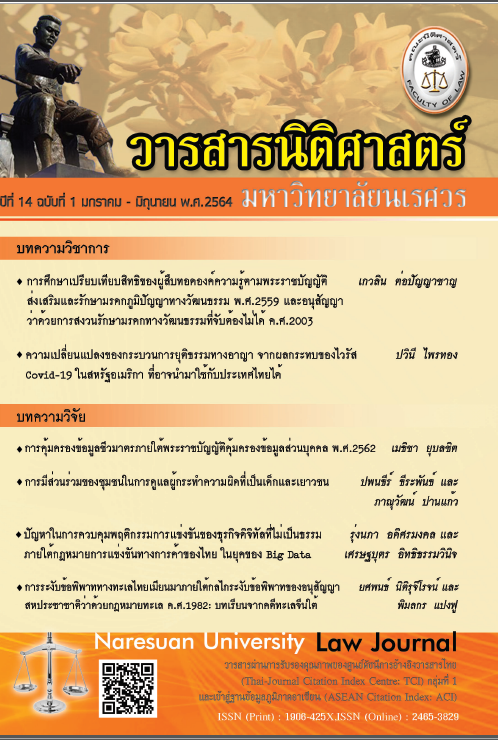A Comparative Study of the Successors Rights of the Promotion and Preservation of Intangible Cultural Heritage Act B.E. 2559 and the Intangible Cultural Heritage Convention 2003
Main Article Content
Abstract
This article aims to study of (1) the successors of knowledge, (2) safeguarding of intangible cultural heritage of the Convention for the Safeguarding of the Intangible Cultural Heritage 2003 and (3) safeguarding of intangible cultural heritage of the Promotion and Safeguarding of the Intangible Cultural Heritage B.E. 2559 (2016). This study is to compare the rights of knowledge successors in line with the Convention for the Safeguarding of the Intangible Cultural Heritage 2003 and The Promotion and Safeguarding of the Intangible Cultural Heritage B.E. 2559 (2016). This study will benefit the amendment of The Promotion and Safeguarding of the Intangible Cultural Heritage B.E. 2559 (2016) for the successors of knowledge rights which leads to more concrete measures. The study found that the Promotion and Safeguarding of Intangible Cultural Heritage Act B.E. 2559 (2016) is not sufficient to protect the rights of the successors of knowledge comparing with the Intangible Cultural Heritage Convention 2003. Therefore, the Promotion and Safeguarding of Intangible Cultural Heritage Act B.E. 2559 (2016) should be re-defined of the successors of knowledge, the right to change and develop the knowledge components of the intangible cultural heritage, the right to participate for the promotion and safeguarding of intangible cultural heritage and the right to deter acts that damage intangible cultural heritage.
Article Details
References
Atip Chansuri. “Development of Indicators for Cultural Heritage Management as a Base for Creative Tourism in Chumphon Province.” PhD diss., Management Program, Silpakorn University, 2017. [In Thai]
Barbe, Noël. “Marina Chauliac et Jean-Louis Tornatore, Intangible Cultural Heritage Exposed to Public Deliberation: A Participatory Experience in a Regional Nature Park.” Accessed March 20, 2020. https://books.openedition.org/gup/191.
Blake, Janet. Unesco’s 2003 Convention on Intangible Cultural Heritage: The Implications of Community Involvement in “Safeguarding.” In Intangible Heritage. New York: Routledge, 2009.
Bouchenaki, Mounir. “A Major Advance towards a Holistic Approach to Heritage Conservation: The 2003 Intangible Heritage Convention.” International Journal of Intangible Heritage 2 (2007): 106-109.
Cang, Voltaire Garces. “Defining Intangible Cultural Heritage and its Stakeholders: The Case of Japan.” International Journal of Intangible Heritage 2(2007): 46-55.
Carril, Beatriz Barreiro. “The Right of Access to Culture: An Effective Human Right For The Establishment Of Consistent Cultural Policies In Europe In The Context Of The Economic Crisis?.” Revista Española de Relaciones Internacionales 5(2013), 44-62.
Department of Cultural Promotion Ministry of Culture. Culture. Way of Life and Wisdom. Bangkok: Rung Silp Printing (1977) Company Limited, 2016. [In Thai]
Development of Well-being and Quality of Life for Women Inmates with Physical and Mental Activities in Daily Life. A Holistic Health Development Manual, Thai Massage. Bangkok: N.p., n.d. [In Thai]
Donders, Yvonne, and Vladimir Volodin Volodi. Human Rights in Education, Science and Culture: Legal Developments and Challenges. Paris: Unessco Publishing, 2007.
Donnelly, Jack. Human Rights in Theory & Practice. New York: Cornell University Press, 2003.
Hafstein, Valdimar Tr. Making Intangible Heritage EI Condor Pasa and Other Stories from Unessco. Indiana: Indiana University Press.
Hans Morten Haugen. “Traditional Knowledge and Human Rights.” Journal of World Intellectual Property 8, no. 5 (2005): 663-677.
Institute of Thai Traditional Medicine. Public Handbook on Health Care with Traditional Thai Medicine. Bangkok: Office of the War Veterans Organization of the Royal Household, 2004. [In Thai]
Kurin, Richard. Safeguarding Intangible Cultural Heritage in the 2003 UNESCO Convention: A Critical Appraisal, in Intangible Cultural Heritage in the 2003 UNESSCO Convention. Oxford: Blackwell Publishing, 2004.
Lixinshi, Lucas. Intangible Cultural Heritage in International Law. Oxford: Oxford University Press, 2013.
Nafziger, James A. R., Robert Kirkwood Paterson, and Alison Dundes Renteln. Cultural Law International, Comparative, and Indigenous. Cambridge University Press, 2010.
Nuad Thai. “Traditional Thai massage.” Accessed March 20, 2020. https://ich.unesco. org/en/RL/nuad-thai-traditional-thai-massage-01384.
Roque, Maria-Àngels. “A Living and Dynamic Heritage.” Quaderns de la Mediterrània 13 (2010): 13-20.
Ruggles, D. Fairchild, Intangible Heritage Embodied. London, New York: Springer Dordrecht Heidelberg, 2009.
Saito, Specialist for Cultural Properties. “Sub-Regional Experts Meeting in Asia on Intangible Cultural Heritage: Safeguarding and Inventory-Making Methodologies.” Bangkok, Thailand, 13-16 December 2005.
Secretariat of the Pacific Community Cultural Affairs Programme. “Guidelines for developing national legislation for the protection of traditional knowledge and expressions of culture based on the Pacific Model Law 2002.” Accessed March 20, 2020. https://www.wipo.int/edocs/lexdocs/laws/en/spc/spc001en.pdf.
Stamatopoulou, E. “Monitoring of cultural human rights: The Claims of Culture on Human Rights and the Response of Cultural Human Rights, The Center for International Human Rights.” John Jay College of Criminal Justice. Paper for the Human Rights Seminar, 3 November 2011.
Stefano, Michelle L., Peter Davis, and Gerard Corsane. Safeguarding Intangible Cultural Heritage. UK: The Boydell Press, 2012.
Sukanya Suchaya. “The Successor does not the Owner of Intangible Cultural Heritage.” Thai Studies Journal 8, no. 2 (August 2012 - January 2013): 97-121. [In Thai]
Thanit Chungthaworn. The report on the Concept of Safeguarding of Thai Local Wisdom. Bangkok: National Center for Genetic Engineering and Biotechnology, National Science and Technology Development Agency, 2007, [In Thai]
“The Forms of Capital.” Last modified 1986. Accessed March 20, 2020.http://bbs.knue.ac.kr/~edupolicy/ lib._.brd/_1.116_/education.


